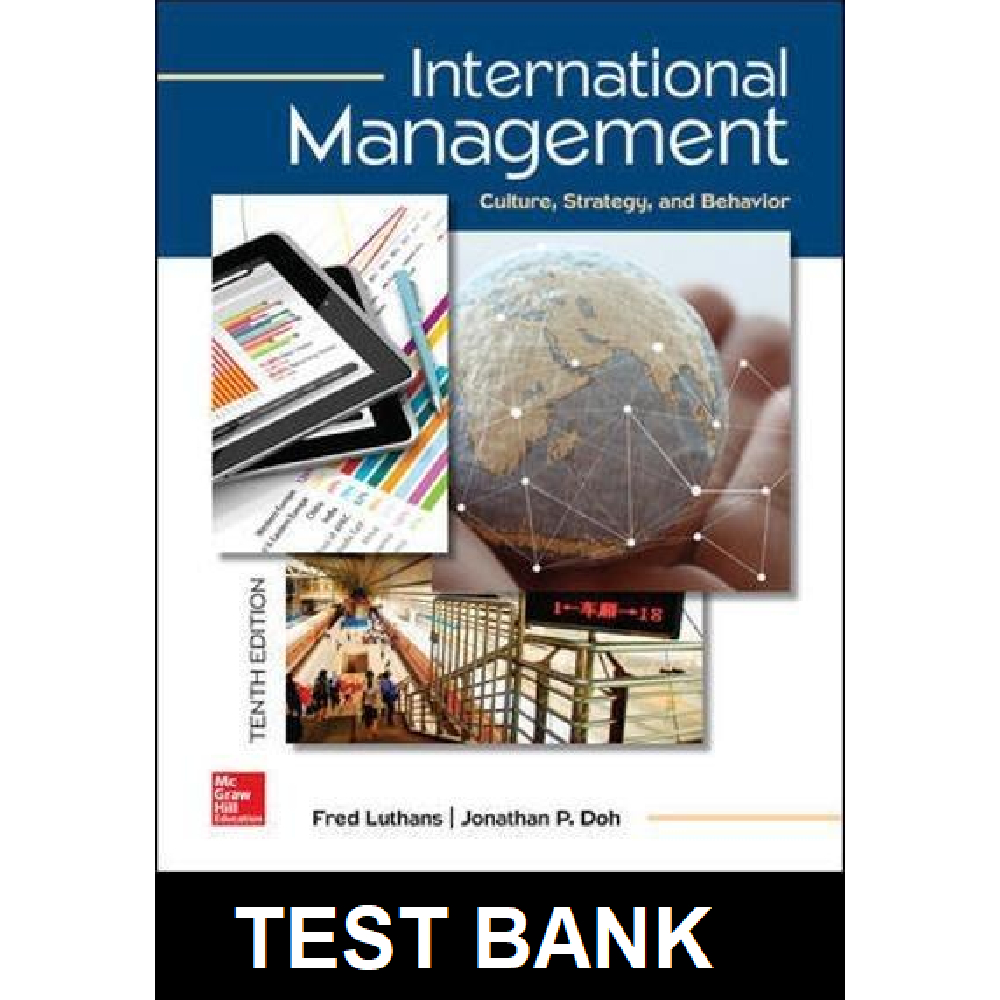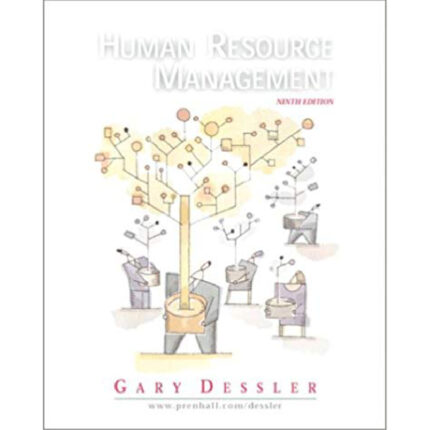International Management Culture Strategy and Behavior 10th Edition By Luthans – Test Bank
Chapter 11
Management Decision and Control
True/False Questions
1. Amazon not only hosts third-party sellers, but the company also acts as a direct merchant itself.
Answer: True
Feedback: Amazon not only hosts third-party sellers, but the company also acts as a direct merchant itself. Amazon buys and sells merchandise, ships products, and warehouses inventory.
AACSB: Analytic
Bloom’s: Remember
Learning Objective: 11-01 PROVIDE comparative examples of decision making in different countries.
Level of Difficulty: 1 Easy
Topic: Global Online Retail: Amazon v. Alibaba
2. While Alibaba’s scale of operations is capital intensive, Amazon’s approach allows for extra financial flexibility, as it does not need to build, staff, and maintain regional warehouses.
Answer: False
Feedback: While Amazon’s scale of operations is capital intensive, Alibaba’s approach allows for extra financial flexibility, as it does not need to build, staff, and maintain regional warehouses. One major downside, however, is that Alibaba gives up control over the shipping and distribution operations of its merchants, meaning that mistakes by third-party businesses could reflect negatively on the company as a whole.
AACSB: Analytic
Bloom’s: Remember
Learning Objective: 11-01 PROVIDE comparative examples of decision making in different countries.
Level of Difficulty: 1 Easy
Topic: Global Online Retail: Amazon v. Alibaba
3. The degree to which a manager is involved in the decision-making process depends only on the structure of a subsidiary.
Answer: False
Feedback: The degree to which managers are involved in the decision-making process depends on the structure of the subsidiaries and the locus of decision making. If decision making is centralized, most important decisions are made at the top; if decision making is decentralized, decisions are delegated to operating personnel.
AACSB: Analytic
Bloom’s: Remember
Learning Objective: 11-01 PROVIDE comparative examples of decision making in different countries.
Level of Difficulty: 1 Easy
Topic: Decision-Making Process and Challenges
4. A key difference between how French and Danish managers view time is that Danish managers do not value time as much as their counterparts.
Answer: False
Feedback: The French do not value time as much as the Danes. The French want to ensure that the best alternative was put into action, whereas the Danes want to act first and take advantage of opportunities.
AACSB: Analytic
Bloom’s: Remember
Learning Objective: 11-01 PROVIDE comparative examples of decision making in different countries.
Level of Difficulty: 1 Easy
Topic: Decision-Making Process and Challenges
5. The Japanese make heavy use of a decision-making process called ringisei or decision making by consensus.
Answer: True
Feedback: The Japanese make heavy use of a decision-making process called ringisei, or decision making by consensus. Under this system, any changes in procedures and routines, tactics, and even strategies of a firm are organized by those directly concerned with those changes.
AACSB: Analytic
Bloom’s: Remember
Learning Objective: 11-01 PROVIDE comparative examples of decision making in different countries.
Level of Difficulty: 1 Easy
Topic: Decision-Making Process and Challenges
6. A legal system called codetermination requires workers and their managers to participate in the discussion of major decisions.
Answer: True
Feedback: Codetermination is a legal system that requires workers and their managers to discuss major discussions. In Germany, managers focus more on productivity and quality of goods and services than on managing subordinates, which often translates into companies pursuing long-term approaches.
AACSB: Analytic
Bloom’s: Remember
Learning Objective: 11-02 PRESENT some of the major factors affecting the degree of decision-making authority given to overseas units.
Level of Difficulty: 1 Easy
Topic: Decision-Making Process and Challenges
7. In domestic situations, when competition increases and profit margins are driven down, home-office management is likely to seek to standardize product and marketing decisions to reduce cost and maintain profitability.
Answer: False
Feedback: In international situations, when competition increases and profit margins are driven down, home-office management often seeks to standardize product and marketing decisions to reduce cost and maintain profitability. Many upper-level operating decisions are made by central management and merely implemented by the subsidiary, although, in some instances, companies still opt to decentralize operations if product diversification is necessary.
AACSB: Analytic
Bloom’s: Remember
Learning Objective: 11-02 PRESENT some of the major factors affecting the degree of decision-making authority given to overseas units.
Level of Difficulty: 1 Easy
Topic: Decision-Making Process and Challenges
8. Concurrent engineering is a total quality management (TQM) technique which encourages designers, engineers, and product specialists to work independently to develop new products.
Answer: False
Feedback: Concurrent engineering/interfunctional teams encourages designers, engineers, production specialists, and customers work together to develop new products. This approach involves all the necessary parties and overcomes what used to be an all-too-common procedure: The design people would tell the manufacturing group what to produce, and the latter would send the finished product to retail stores for sale to the customer.
AACSB: Analytic
Bloom’s: Remember
Learning Objective: 11-02 PRESENT some of the major factors affecting the degree of decision-making authority given to overseas units.
Level of Difficulty: 1 Easy
Topic: Decision-Making Process and Challenges
9. As a total quality management (TQM) technique, rewards and recognition tend to be effective universally.
Answer: False
Feedback: The rewards and recognition approaches that work well in one country may be ineffective in another. For example, individual recognition in the U.S. may be appropriate and valued by workers, but in Japan, group rewards are more appropriate as Japanese do not like to be singled out for personal praise.
AACSB: Analytic
Bloom’s: Remember
Learning Objective: 11-02 PRESENT some of the major factors affecting the degree of decision-making authority given to overseas units.
Level of Difficulty: 1 Easy
Topic: Decision-Making Process and Challenges
10. Efficient processes become increasingly important as diversification or differences between the parent and subsidiary increase.
Answer: True
Feedback: Efficient processes become increasingly important as diversification or differences between the parent and subsidiary increase. This refers not only to specific products and services that may need to be tailored to geographic areas, but also to the socioeconomic, political, legal, and cultural environments in which the subsidiary exists.
AACSB: Analytic
Bloom’s: Remember
Learning Objective: 11-02 PRESENT some of the major factors affecting the degree of decision-making authority given to overseas units.
Level of Difficulty: 1 Easy
Topic: Decision-Making Process and Challenges













Reviews
There are no reviews yet.